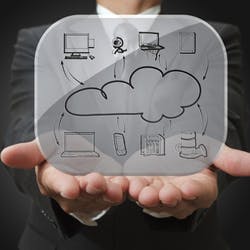If you’ve read anything about accounting software in the past year, odds are you’ll have come across references to cloud technology. So what is cloud technology? And why would you be interested?
Essentially, accounting software with a cloud component enables accounting data to be stored securely offsite – usually on servers managed by a cloud provider – and accessed remotely by you anywhere, anytime via the internet.
Today, most offers are based on either terminal server or browser technology. Although it’s recently become a buzz word, the cloud is not a new a concept. If you’re using email then you’re using cloud technology. If you’re accessing your bank account online then you’re using cloud technology. And so on.
Large businesses have been using private clouds for many years to help facilitate multiple users accessing central business systems at the one time, and to connect their ERP systems with 3rd party providers or customers (eg. online ordering). Now we are seeing the emergence of a number of affordable solutions for small to medium businesses, so that you can take advantage of the same technology big businesses use to drive efficiency, enhance the customer experience and keep up with the competition.
So why might you consider moving to a cloud based accounting system?
1. Work on your business where and when you want – in the office, at home, or on the road:
When your accounting software is held on a hard drive on a computer, it can only be accessed when that computer is available. For many businesses, this means access is restricted to a single computer and a single location. When you move to a cloud solution, you have the flexibility of being able to access your company files anywhere you have access to the internet. So, you can have one team member out with the laptop recording quotes or sales while another does the book keeping at a different location. Both are inputting their data into the same place. No double keying necessary and no need to take turns when accessing files.
2. Peace of mind – you’re always backed up:
With your business information held in a secure third party server, you always have a secure data back up, so that essential business operating data is still available if something goes wrong with the office computer. Think about what you would do if your office was flooded, ravaged by fire or raided by thieves. Is your important business information safe and accessible no matter what?
3. Build your business by sharing data with your financial advisor in real time:
If you choose, you can give your accountant or bookkeeper (or both!) access to your company files via the cloud. This eliminates time consuming file transfers and travel, and also gives you the opportunity to have your accountant, book keeper or other collaborate with you on building your business by monitoring in real time key business indicators such as inventory levels and debtors.
There are a number of product options out there – MYOB LiveAccounts is one. Be sure to do your research on the credibility of software providers, compare the benefits and cost of all-in-one software versus software that requires a number of “add-ons” and – most importantly – make the most of the product you choose. Using your cloud accounting software without compromise could see you move faster on the road of business growth…

